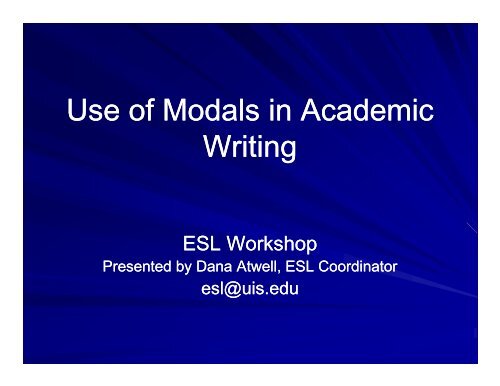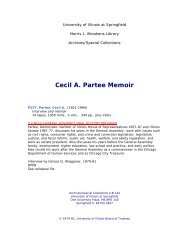Use of Modals in Academic Use of Modals in Academic Writing
Use of Modals in Academic Use of Modals in Academic Writing
Use of Modals in Academic Use of Modals in Academic Writing
Create successful ePaper yourself
Turn your PDF publications into a flip-book with our unique Google optimized e-Paper software.
<strong>Use</strong> <strong>of</strong> <strong>Modals</strong> <strong>in</strong> <strong>Academic</strong><br />
Writ<strong>in</strong>g<br />
ESL Workshop<br />
Presented by Dana Atwell, ESL Coord<strong>in</strong>ator<br />
esl@uis.edu
<strong>Academic</strong> Writ<strong>in</strong>g<br />
Asks you to:<br />
Analyze<br />
Synthesize<br />
Interpret<br />
Discuss<br />
Explore<br />
Expand<br />
Infer<br />
To see how you respond to <strong>in</strong>formation
Interpretation vs. Fact<br />
Interpret => make claims => <strong>of</strong>fer ideas,<br />
possibilities, suggestions<br />
(Present f<strong>in</strong>d<strong>in</strong>gs which may not be the only way to<br />
view someth<strong>in</strong>g)<br />
Fact = provable, certa<strong>in</strong>, reproducible<br />
When <strong>in</strong>terpret, allow for the reader or other<br />
experts to draw conclusions too. Accept<br />
possibility <strong>of</strong> other positions.
Conclusions from a study<br />
While the f<strong>in</strong>d<strong>in</strong>gs <strong>of</strong> this study seem <strong>in</strong> l<strong>in</strong>e with the<br />
studies that have come before there were a number <strong>of</strong><br />
concern<strong>in</strong>g issues. First, surveys should be<br />
adm<strong>in</strong>istered to people p act<strong>in</strong>g as participants, p not by<br />
friends pos<strong>in</strong>g as participants <strong>in</strong> order to dim<strong>in</strong>ish the<br />
number <strong>of</strong> “prank” responses. In life, some participants<br />
are pranksters, so is chalked up to <strong>in</strong>dividual differences.<br />
Second, it is more reliable to have another rater… To be<br />
more useful, a study <strong>of</strong> this nature needs further, and<br />
more prudent research. That notwithstand<strong>in</strong>g, this study<br />
shows that pragmatic competence is important and<br />
relevant to course design.
Conclusions from a study<br />
While the f<strong>in</strong>d<strong>in</strong>gs <strong>of</strong> this study seem <strong>in</strong> l<strong>in</strong>e with the<br />
studies that have come before there were a number <strong>of</strong><br />
concern<strong>in</strong>g issues. First, surveys should be<br />
adm<strong>in</strong>istered to people p act<strong>in</strong>g as participants, p not by<br />
friends pos<strong>in</strong>g as participants. This could dim<strong>in</strong>ish the<br />
number <strong>of</strong> “prank” responses. In life, some participants<br />
are pranksters, so this might be chalked up to <strong>in</strong>dividual<br />
differences. Second, it would be more reliable to have<br />
another rater… To be more useful, a study <strong>of</strong> this nature<br />
would need further, and more prudent research. That<br />
notwithstand<strong>in</strong>g, this study is pedagogically <strong>in</strong>terest<strong>in</strong>g<br />
because teachers may decide <strong>in</strong>struction <strong>in</strong> pragmatic<br />
competence should be built <strong>in</strong>to the course design.
Will<br />
would<br />
can<br />
could<br />
shall<br />
<strong>Modals</strong><br />
<strong>Modals</strong> = verbs that <strong>of</strong>fer shades <strong>of</strong> mean<strong>in</strong>g<br />
<strong>Modals</strong> express vary<strong>in</strong>g degrees <strong>of</strong> possibility or<br />
certa<strong>in</strong>ly about a statement<br />
<strong>Modals</strong> can improve your credibility<br />
should<br />
may<br />
might<br />
must
Form: <strong>Modals</strong><br />
Invariable – do not change <strong>in</strong> number<br />
Followed by base form <strong>of</strong> ma<strong>in</strong> verb<br />
(should do) ) or help<strong>in</strong>g verb + ma<strong>in</strong> verb<br />
(h (should ldb be do<strong>in</strong>g)<br />
)<br />
Never <strong>in</strong>sert “to” between modal + verb
When used with “not”<br />
1. Modal + not + verb might not attend<br />
2. Informal writ<strong>in</strong>g (emails) contract<br />
can + not<br />
= can’t<br />
will + not<br />
= won’t<br />
would + not = wouldn’t<br />
should + not<br />
= shouldn’t<br />
could + not<br />
= couldn’t<br />
3. Formal writ<strong>in</strong>g (proposals, papers, bus<strong>in</strong>ess letters)<br />
full form<br />
can + not<br />
= cannot
Exam<strong>in</strong><strong>in</strong>g Your Position<br />
Are you an expert?<br />
Exam<strong>in</strong>e your evidence, your<br />
background to determ<strong>in</strong>e how committed<br />
you are to your <strong>in</strong>terpretation.<br />
Who would say each <strong>of</strong> the follow<strong>in</strong>g:<br />
1. The erosion may have been caused by the w<strong>in</strong>d.<br />
2. The erosion must have been caused by the w<strong>in</strong>d.
Scale <strong>of</strong> Certa<strong>in</strong>ty<br />
could/might<br />
may<br />
should<br />
must<br />
will<br />
could/might<br />
weak <strong>in</strong>ference/ low possibility<br />
stronger/perhaps, quite possibly<br />
strong/ moderate possibility, probable<br />
very strong/ certa<strong>in</strong>ly<br />
strongest/ very certa<strong>in</strong>ly<br />
It ______ ra<strong>in</strong> today.<br />
may<br />
should<br />
must<br />
will
Lower End <strong>of</strong> Scale <strong>of</strong> Probability<br />
might<br />
may<br />
won’t/ wouldn’t<br />
can’t/couldn’t<br />
low possibility<br />
Impossibility
Past time<br />
To express degrees <strong>of</strong> possibility about past<br />
time, use:<br />
might, may, could, should, would<br />
If the results had come <strong>in</strong> sooner, it might have made a difference.<br />
vs.<br />
If the results come tomorrow, it may make a difference.
Exercise<br />
<strong>Use</strong> a modal verb <strong>in</strong> place <strong>of</strong> the underl<strong>in</strong>ed words and phrases. You<br />
might need to reconstruct the sentence rather than substitute words.<br />
Example: It is certa<strong>in</strong> that the sales tax is go<strong>in</strong>g to <strong>in</strong>crease next year.<br />
Answer: Sales tax will <strong>in</strong>crease next year.<br />
1. The scientist i found it impossible ibl to present her analysis because she had<br />
not collected all her data.<br />
2. There is a low possibility that the shipment arrived yesterday afternoon.<br />
3. It is quite likely that locally-grown tomatoes are available at the farmer’s<br />
market.<br />
4. It is surely not possible that he is the person they hired!<br />
5. It has ra<strong>in</strong>ed for four days, so it is highly probably that the ground is very<br />
soggy.<br />
6. He is likely to see benefits from his exercise program.<br />
7. The w<strong>in</strong>ds are <strong>in</strong>creas<strong>in</strong>g at an alarm<strong>in</strong>g rate so there is a high probability<br />
that a tornado is on the way.<br />
Raimes, Ann. Grammar Troublespots. New York: Cambridge University Press,<br />
2004. 75.
Answer Key<br />
1. The scientist couldn’t present her analysis…<br />
2. The shipment might have arrived yesterday afternoon.<br />
3. Locally grown tomatoes should be available…<br />
4. He can’t bethe person they hired!<br />
5. …so the ground must be very soggy.<br />
6. He should see benefits from his exercise program…<br />
7. …so a tornado must be on the way.<br />
Raimes, Ann. Grammar Troublespots. New York:<br />
Cambridge University Press, 2004. 178.
Alternatives & Supplements<br />
Suggest – This study suggests that ….<br />
Seem – Cisneros seems to imply…<br />
Appear – The results appear to show …<br />
Indicate – This high passage rate <strong>in</strong>dicates ….<br />
<strong>Use</strong> “I” – I believe this evidence po<strong>in</strong>ts to ….<br />
“While…, …” sentences – While I conclude X,<br />
others might conclude Y.
Summary<br />
<strong>Modals</strong> shade mean<strong>in</strong>g<br />
Many contexts t (request<strong>in</strong>g, recommend<strong>in</strong>g,<br />
express<strong>in</strong>g ability, academic writ<strong>in</strong>g)<br />
Modal + Verb<br />
Never modal + modal +verb or modal + to +verb
Further Resources<br />
1.http://www.englishpage.com/modals/moda<br />
l<strong>in</strong>tro.html<br />
2.http://www.learnenglish.org.uk/grammar/ar<br />
chive/modal_verbs01.html<br />
3.http://en.wikipedia.org/wiki/English_modal<br />
/ iki/E h d l<br />
_auxiliary_verb<br />
4. Your writ<strong>in</strong>g handbook

















